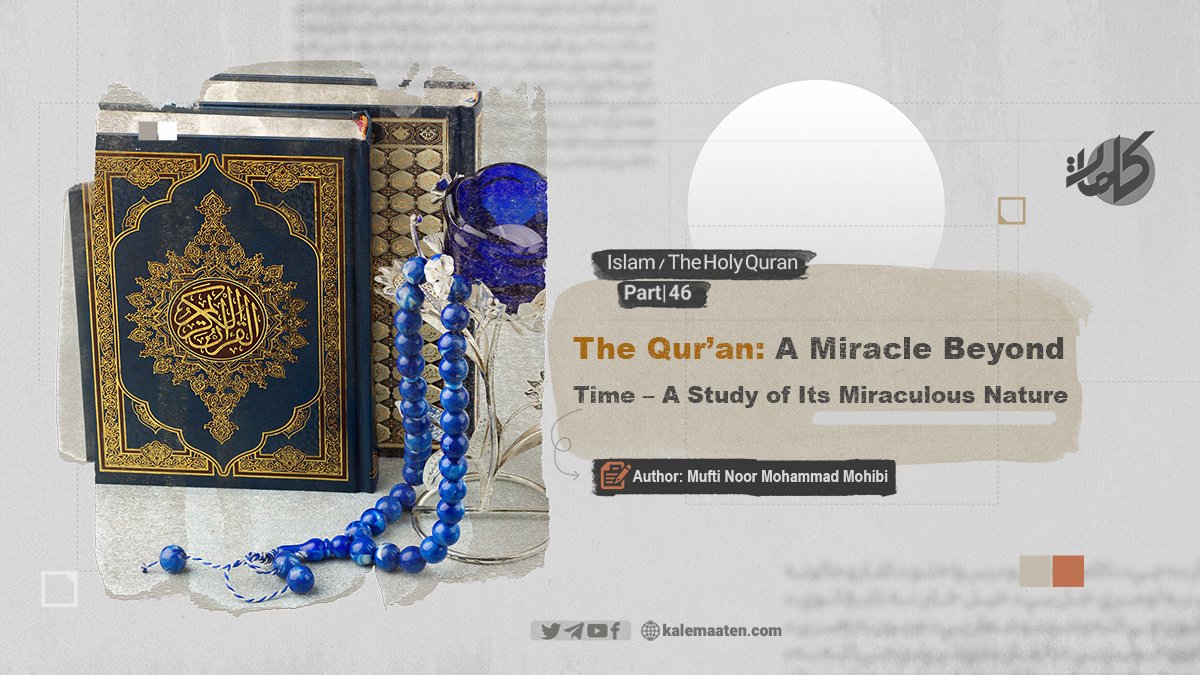Author: Mufti Noor Mohammad Mohibi
The Qur’an: A Miracle Beyond Time- A Study of Its Miraculous Nature (Part 46)
Scientific and Jurisprudential Analysis of the Principle “What Becomes Forbidden through Breastfeeding Is What Becomes Forbidden through Lineage”
The principle “What becomes forbidden through breastfeeding is what becomes forbidden through lineage” is one of the key foundations in Islamic jurisprudence. Due to the kinship bonds created through breastfeeding, this rule leads to the prohibition of marriage among individuals connected through this relationship. This principle is based on the text of the Noble Qur’an and the Prophetic Sunnah and has been widely accepted throughout the history of Islamic jurisprudence. With the advancement of biological and genetic sciences, it is now possible to examine the scientific basis of this rule in a precise and well-documented manner—one that aligns with its religious foundation and opens new horizons for understanding biological and legal connections.
The Sharia Basis for Prohibition through Breastfeeding
In Surah Al-Nisa’, Allah the Exalted clearly outlines the categories of prohibited relations, and in addition to lineage-based prohibitions, He also mentions breastfeeding-based prohibitions: «وَأُمَّهَٰتُكُمُ ٱلَّٰتِیٓ أَرضَعنَكُم وَأَخَوَٰتُكُم مِّنَ ٱلرَّضَٰعَةِ»[1] Translation: “And your mothers who breastfed you and your sisters through breastfeeding.”
This verse shows that women who breastfeed a child become akin to the child’s real mother, and the breastfeeding sisters are treated as biological sisters from a legal-religious standpoint. This is the first foundational jurisprudential basis for establishing breastfeeding relationships and the legal rulings derived from them.
There is also a well-known narration from Aisha (MABH) regarding the prohibition through breastfeeding, in which the Prophet (PBUH) emphasized this principle when he told her: «إنه عمك، فلیلج علیك» [2] Translation: “He is your uncle, so he may enter upon you.” This Hadith demonstrates that breastfeeding relations are treated equally to biological relations in terms of legal prohibitions.
Scientific and Biological Interpretation of Breastfeeding Prohibition
The Biological Nature of Breast Milk
Breast milk, in addition to its nutritional components, contains living cells such as lymphocytes, macrophages, and epithelial cells. These cells carry DNA and RNA, and they possess the capability to influence the immune and genetic systems of the child.
Cell Penetration and Genetic Transfer
Modern genetic and biological studies have shown that the cells present in breast milk can cross the intestinal barrier of the infant, enter the bloodstream, and settle in various tissues. These cells may merge with the child’s cells and become part of his or her genetic material. This phenomenon is known as microchimerism, and its influence on the genetic makeup of the child has been scientifically confirmed.
Genetic Compatibility of the Child
Due to the immaturity of the infant’s immune system, the child can accept and integrate maternal cells without identifying and destroying them as foreign agents. This provides the biological basis for creating a non-biological but genetically influential kinship between the breastfeeding mother and the child.
The Importance of the Breastfeeding Prohibition Principle in Islamic Law
Jurisprudential Logic in Light of Scientific Findings
The Messenger (PBUH) said: «یحرم من الرضاعة ما یحرم من الولادة[3]» Translation: “What becomes forbidden through breastfeeding is what becomes forbidden through birth (lineage).”
Beyond merely stating a legal ruling, this Hadith points toward a biological and genetic reality that was scientifically established centuries later. Therefore, the Islamic ruling aligns with an objective scientific truth.
The prohibition established through breastfeeding arises from genetic and cellular transfer that creates a bond exceeding mere physiological interaction.
Legal and Social Implications
The prohibition arising from breastfeeding preserves social order, prevents lineage confusion, and protects families from potential complications arising from inappropriate marriages. This represents an ethical and social necessity in Islamic society based on concrete biological realities.
In summary, the principle “What becomes forbidden through breastfeeding is what becomes forbidden through lineage” holds significant importance both religiously and jurisprudentially, and it is also scientifically justifiable. New scientific findings demonstrate that breast milk contains cells and genetic material that can integrate into the child’s body and create a biological and genetic bond between the breastfeeding mother and the child. This biological reality forms a strong scientific foundation for the religious ruling conveyed by the Messenger of Allah (PBUH) through divine revelation. Therefore, this principle stands as a clear example of harmony and mutual reinforcement between religion and science in regulating human relations and safeguarding social welfare.
Continues…
Previous Part/ Next Part
References:
[1] Al-Nisa’: 23.
[2] Sahih Muslim, Book of Breastfeeding, Chapter: Prohibition of Breastfeeding Through the Milk of the Husband, Hadith 1445, Vol. 2, p. 1070 (T. Abdul-Baqi).
[3] Sahih Muslim, Book of Breastfeeding, Chapter: What Becomes Forbidden Through Breastfeeding Is What Becomes Forbidden Through Birth, Hadith 1444, Vol. 2, p. 1068 (T. Abdul-Baqi).
[4] Summary from: Mawsoo‘at al-I‘jaz al-‘Ilmi fi al-Qur’an wa al-Sunnah, Vol. 1, pp. 106–107.



